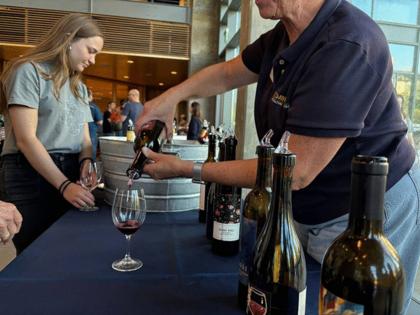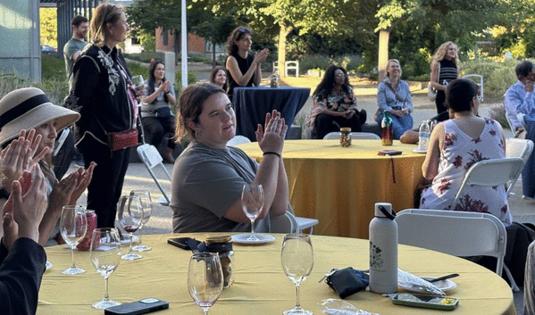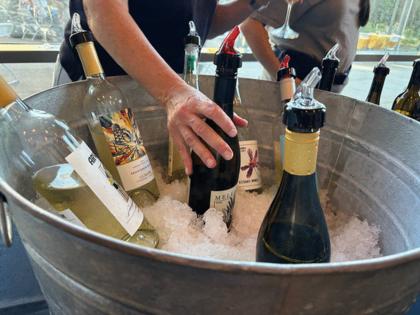Student-made wines debut at UC Davis after decades of legal barriers
Published in Business News
It’s not uncommon to try crisp white wines and rich reds at a UC Davis viticulture and enology party. But at Wednesday’s soiree, the grapes were crushed, juices fermented, wines packaged and bottles designed entirely by students — and you can get a taste, too.
Wine production students are now getting the opportunity to share the wine they create at school with family, friends and the wider community for the first time, after a state law paved the way for UC Davis to sell wine.
For most of the university’s 145-year viticulture and enology history, it was not permitted to sell its wine because of its status as a public institution. Thousands of gallons of student-produced wine were consumed only by the sewer pipes, according to viticulture and enology professor David Block.
In 2020, California Gov. Gavin Newsom signed a law that removed language barring UC Davis from selling wine through an affiliated nonprofit entity, allowing the distribution of up to 20,000 gallons annually.
After more than 12 years of waiting for new legislation, consulting a slew of attorneys and obtaining federal and state permits, student-made wines are now available for public sale through the department’s nonprofit, Hilgard631, Block said.
The nonprofit’s name honors the history of the university’s viticulture and enology program, according to department chair Ben Montpetit. “Hilgard” refers to Eugene Hilgard, the founding director of UC Davis’s Agriculture Experiment Station, while 631 is the street address of the department’s on-campus teaching winery.
On Wednesday evening, the university debuted a series of six red and white wines students produced throughout the spring quarter. In a 10-week course that focused on post-fermentation wine production, viticulture students worked in three groups to blend, bottle and label two wines each — one red and one white.
Sales started at 7 p.m. Wednesday, and Block ensured he was the first person in line.
“In the end, what really comes out of it is that the wine doesn’t go down the drain,” he said.
Proceeds from this year’s sale of 500 gallons will go right back into the school, funding scholarships to support future winemakers at the university, Montpetit said.
The wine is available for purchase at the Teaching and Research Winery at 631 Hilgard Road in Davis. Sales will run from 2 to 4 p.m. on June 24-26, July 10 and July 24. Bottles of student-made wine cost between $30 and $40, while wines produced at the university’s Napa Valley vineyard, Oakville Station, range from $50 to $125.
Leticia Chacón-Rodriguez, the program’s lead winemaker, said showcasing the wines helps build students’ confidence.
“They’re so proud to be able to (say), ‘Okay, I made this, I can share it now with my family, with my friends.’” Chacón-Rodriguez said. “It’s the sharing piece, the social aspect.”
Michael Acierno, a senior in the viticulture and enology program, said it feels “amazing” to see wines he developed with his classmates be available to a wider audience.
“We didn’t know about (the wine sale) until halfway through the quarter,” Acierno said. “This is a very monumental moment for the department ... To be able to be a part of this event is very special.”
In the post-fermentation production course, students get complete control on every aspect of their wine, from the blend to designing the bottle’s branding, which first-year graduate student Victoria Lasch said was a unique feature of the curriculum.
“(Branding is a) part of post-processing that a lot of us will never even get to experience,” Lasch said. “A lot of wineries already have a marketing department or their labels and stories are already set up.”
Viticulture and enology graduate student Megan Hill said the class provides an opportunity for students to step into the role of lead winemakers who get the final say over the end product.
“When you’re an intern ... it’s up to the winemaker (or) the enologist, but in this class, we got to make those decisions,” Hill said. “Who knows how long we have to be in the industry before we actually get to make those decisions in the real world?”
©2025 The Sacramento Bee. Visit at sacbee.com. Distributed by Tribune Content Agency, LLC.

















Comments